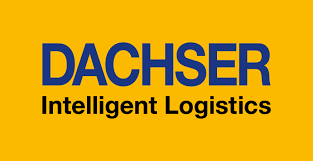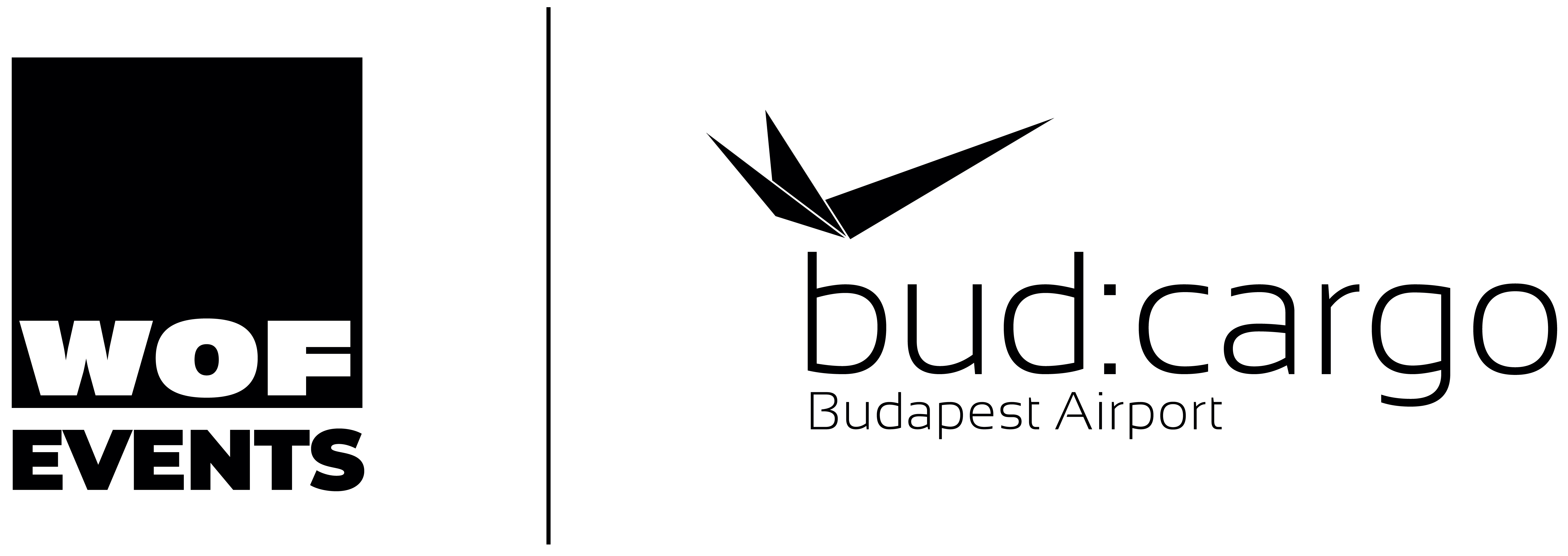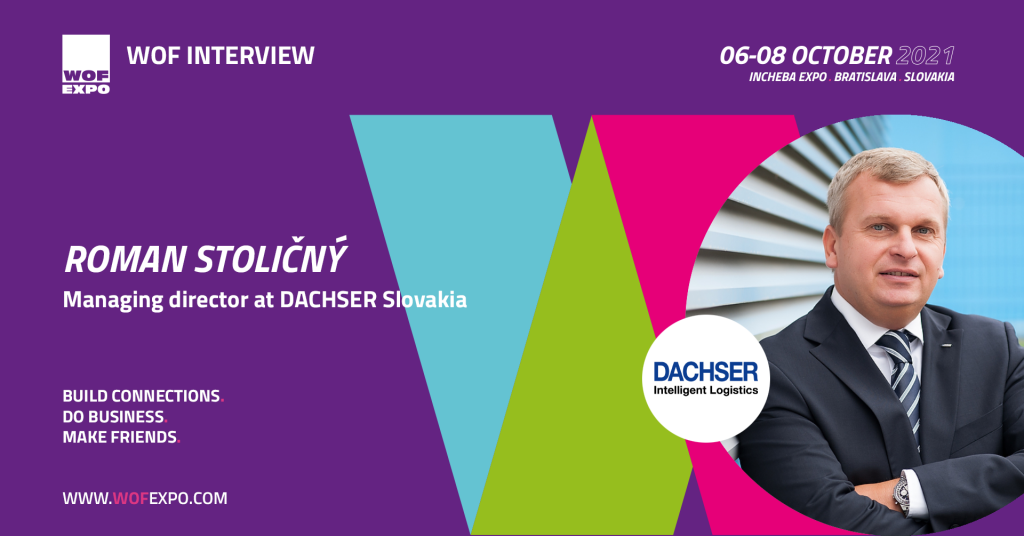Interview with Roman Stoličný
Mr. Roman Stoličný is the Managing Director and a member of the Board of Directors of DACHSER Slovakia, and has also held the position of Country Manager of LIEGL & DACHSER in the Hungarian subsidiary DACHSER for almost two years. Mr. Stoličný has been working in the field of logistics for more than twenty years now. He started his career as a commercial pilot in the Swiss-Slovak airline Tatra Air in 1992. He was the director of the logistics company Lindbergh Air Freight from 1995 to 2004. This company became part of the international DACHSER Group in 2004. Roman Stoličný was in charge of the entire integration process, which was successfully completed on January 1, 2010. Roman Stoličný still holds an active pilot’s license and enjoys flying in his spare time. |
| 1. More than a year has passed since the coronavirus crisis has turned the world upside down, affecting the life of society and the global economy. How would you evaluate the effect of the pandemic on logistics? When the whole world found itself in a coronavirus crisis a year ago, it was a big shock to everyone. We had to find a way to face a situation that none of us had experienced before. Crisis teams were activated and despite quick decisions, we had to keep a cool head to find the best possible solutions. It was necessary to minimize the risk impact on society and at the same time ensure the protection of the health of our colleagues, families, employees. Even though we had to deal with many complications, the logistics industry has been lucky in the mids of misfortune and emerged as one of the big winners of the coronavirus pandemic. We have been part of critical infrastructure such as the transport and logistics sector inland freight, which has been encouraged to work with drivers having exceptions to travel abroad precisely to ensure the functionality of the economies of individual countries. Although today, at the beginning of 2021, the crisis is far from over, our views have changed. We have learned to be faster and more flexible and to respond promptly to constant changes so that we can meet the requirements of our clients at the same level as before. We were forced to accelerate the implementation of some planned changes and thus put into practice innovative technologies and IT solutions that are important for us as a company in the long run. 2. Digitization and automation of the entire logistics industry is undoubtedly a key topic and is currently at an all-time high. What innovations have you put into practice in the past period and what are your next plans? DACHSER has been a logistics innovator and trailblazer since its founding. The computer technology and data are fully used and benefit the entire supply chain. They help to increase the predictability, efficiency, and sustainability of goods and information flows in times of limited resources. DACHSER has its own research and development department at its headquarters in Kempten, Germany, and invests considerable resources in its own IT solutions to ensure its competitiveness. The key to success is solutions that are universal and at the same time flexible enough to be able to adapt to the individual needs of clients as well as the locations. The pilot phase of the first and last mile automation project is currently underway at selected DACHSER locations. This is a pan-European project of DACHSER, which is now being launched in Slovakia too. Drivers on the distribution lines received Zebra TC 77 mobile terminals, which enable better planning of pick-up and delivery. They are already in place at the branches in Lozorno and Martin, where 42 of these facilities were put into operation. Further implementation of the terminals will follow in the Košice branch. Thanks to the new software, the driver has access to all the information about loading and unloading on the last and first mile and can monitor and respond to deviations from the plan and inform the dispatcher about them, because the terminal also functions as a mobile phone. The high potential of Zebra terminals includes translator and multilingual settings, messenger, camera functions, navigation and more. The implementation of new mobile terminals is also closely related to the Short Distance Planning and XDP – an algorithm for intelligent, automatic route planning, which will enable better and more detailed planning on the last and first mile based on shipment data, vehicles and customer requirements such as. delivery data/pick-up of the consignment with hydraulic platform only, opening time of the consignee/consignor, time restriction of delivery according to the selected product or restriction by infrastructure (bridges, underpasses, etc.). 3. The increasingly urgent need to protect the environment is a major challenge for logistics. Reducing emissions from road transport and aviation is one of the main priorities outlined in the EU Green Deal Agreement. Has DACHSER taken any steps that could help reduce its carbon footprint? The search for greener and at the same time more sustainable transport solutions is a long-term commitment for DACHSER. We deal with this topic at all levels, from thorough planning, the development of electromobility to the use of alternative energy sources and fuel. We strive for the maximum ecological solutions, because we believe that this is the right way. We can calculate emissions from transport up to the level of individual customers and deliveries. This allows us to precisely set up and optimize the transport itself. Our goal is to minimize emissions of CO2, dust particles and noise levels. Thanks to detailed information from our Domino and Othello systems, we have a perfect overview of all orders, their volumes and weights. We plan exactly what type of vehicle we will use and in what emission class. Drivers are trained for economical driving and vehicles have tires that allow for lower fuel consumption. Road trains are used to reduce emissions over longer distances, and electric cars or electric cars are already working successfully in shorter distances in a few European cities. We have the concept of Emission-Free Delivery enabling emission-free deliveries of groupage shipments in cities in Germany and Spain. Electric FUSO eCanter vans or Mercedes-Benz eActros are in operation. These vehicles are part of our City Distribution project. Through them, DACHSER extends an innovative and sustainable concept for supplying urban centers. Shipments in city centers are also delivered using electric trucks, which make it possible to overcome traffic jams and serve places that motor vehicles cannot enter. Another example of ecological solutions within logistics are, for example, solar panels placed on the roofs of trucks. DACHSER plans to replace all of its ground handling equipment in Europe with energy-saving lithium-ion battery technology by the end of 2022. They are characterized by three times longer service life and significantly shorter charging times. They do not contain toxic heavy metals such as conventional batteries and save energy by saving about 1,600 kilograms of CO2 per handling vehicle and year. With 6,000 handling equipment, this represents 9.6 million kilograms of CO2 per year. In addition, DACHSER has become a member of the DWV Association for the Support of Hydrogen Technologies in Transport and will also participate in the activities of the HyLogistics working group. They aim to provide political support for the preparation and commercialization of fuel cell trucks to reduce greenhouse gas emissions in freight transport and to represent these interests before German and European politicians and ministries. 4. What do you consider to be the main barriers to the implementation of alternative fuels? The promotion of revolutionary innovations and technologies is and has always been a long way off. The same case as the implementation of alternative fuels. It is partly because we still have a long way to go to improve them and use them in everyday life, and partly because there is a conflict of interest in relation to companies operating in the production and distribution of standard fuels. Fortunately, we do move forwards, one step at a time. We at DACHSER believe that being actively involved in the process of promoting alternative drives is of a great importance and this effort made will be of a great worth in future. 5. What is your opinion about positioning WOF EXPO in Central and Eastern Europe region? In terms of European logistics, Slovakia is an important location because it lies in the heart of Europe, at the crossroads of roads connecting east with west and south with north. It is for this same reason that one of DACHSER’s three key Eurohubs was located near Bratislava, where goods transported from one end of Europe to the other or to ports, from where they travel further into the world. From this point of view, the location of the WOF EXPO exhibition in the CEE location is also logical and meaningful. At DACHSER, we are very pleased with this choice. |
 | DACHSER, the family-owned business based in Germany, is a leading European provider in the field of logistics. DACHSER provides a seamless transport network with warehousing and customer-specific services in three business areas: DACHSER European Logistics, DACHSER Food Logistics and DACHSER Air & Sea Logistics. Thanks to a comprehensive transport network both in Europe and overseas and exemplary IT solutions that are fully integrated into all systems, DACHSER creates intelligent combination and integration of logistics network competences worldwide. DACHSER has a total of 393 branches in 44 countries all over the globe with almost 31,000 employees. DACHSER has been operating in Slovakia since 1995 and currently has 5 branches with more than 200 employees.
www.dachser.sk |

